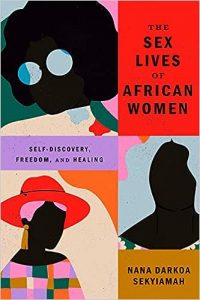Nana Darkoa Sekyiamah, a Ghanaian feminist, humorously acknowledges her current predicament: “I’m experiencing the lowest level of sexual activity in my life,” even as she bursts into laughter.

Despite this ironic circumstance, Sekyiamah has emerged as a recognised authority on sex, particularly among African women and the diaspora. Over the past decade, she has built her professional reputation around exploring sexual dynamics, becoming a prominent figure in the field. At 44, her work revolves around understanding how African women and those in the diaspora perceive, engage with, and derive pleasure from sex, or sometimes the lack thereof.
Her journey began in 2009 when she co-founded “Adventures from the Bedrooms of African Women,” an award-winning blog, alongside fellow Ghanaian feminist writer Malaka Grant. This initiative marked the genesis of her journey as a transnational chronicler of sex and sexuality. The culmination of this effort arrived in July of the preceding year, as her nonfiction debut, “The Sex Lives of African Women,” saw its release in the UK before arriving in the US in early March.
In this book, she weaves together her personal experiences and her subjects’ stories, sharing insights into her queer identity and broader narratives from African-identifying women worldwide. These narratives, often told under pseudonyms, delve into intimate details of sexual experiences, aspirations, and challenges, highlighting how cultural frameworks mould both public perceptions and private lives.
Sekyiamah’s candour about her current sex life aligns with her open approach to discussing “The Sex Lives of African Women,” a book that has garnered positive feedback. Her conversational style effortlessly switches between weighty discussions about sexual liberation and the lighter aspects of dating and joy.

Sekyiamah’s core aspiration lies in fostering autonomy for African and African-descendant women within their cultural contexts, shifting away from Western ideals. Settling onto a maroon couch, she offers her favourite cocktail, a Martini Fiero with tonic, ice, and lemon, in a room adorned with a compelling photograph of an elderly Ghanaian woman taken by her friend Nana Kofi Acquah.
Addressing her recent lack of sexual activity, Sekyiamah attributes it to both the pandemic and her role as a single mother through adoption. She reveals how her partner at the time ended their relationship due to her new parental responsibilities. This life-altering event has redefined her criteria for a partner, emphasising shared life stages over geographical proximity.
Discussing the evolution of commitment and relationships, Sekyiamah notes the shifts in Ghanaian culture: “Religious, conservative postcolonial ideas around commitment and the nuclear family” have taken hold, although these concepts weren’t always dominant. She recalls her grandmother’s multiple marriages, reflecting on societal changes influenced by religion.
Sekyiamah emphasises this societal shift: “Christianity.… Islam, it’s brought these really strict mores and norms that didn’t exist before.” She contrasts this with her grandfather’s polygamous relationships, where independence and freedom were the norm, a stark contrast to today’s expectations.
Her book draws on her established relationships with interviewees, cultivated during her time working with the Association for Women’s Rights in Development. These connections foster intimate discussions that often take place over shared meals, conducted in the interviewee’s preferred language.
Religion’s impact on sexual liberation emerges as a recurring theme. Chantale, for instance, ties her sexual perspective to Haitian voodoo, where sexuality and the divine are interconnected. Sekyiamah’s exploration dismantles the notion of an inherent conflict between spirituality and sexuality.
Sekyiamah’s personal journey unfolds as she embraces her queer identity within the confines of Ghanaian society. Despite societal resistance, her authenticity shines through, offering a beacon of hope in the face of prevailing homophobia.
Defying the conventional permanence of relationships, Sekyiamah’s acceptance of divorce as a valid option is remarkable. She openly shares her past infidelity without self-condemnation, shattering the notion that women must be eternally bound to their choices.
Sekyiamah’s goal, which her interview subjects shared, is to de-stigmatise discussions about sex and female desire throughout the book. By highlighting older women who continue to embrace their sexuality, she challenges the stereotype that sexual desire diminishes with age.
Amidst laughter about her own sexual experiences, Sekyiamah remains cognizant that her journey is far from over. Her personal transformation and the stories she shares underscore the need to recognise women’s desires as an integral part of their identities, irrespective of age or societal norms.
Publisher : Astra House (March 1, 2022)
Language : English
Hardcover : 304 pages
ISBN-10 : 1662650817
ISBN-13 : 978-1662650819
Available at Amazon


